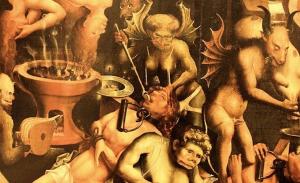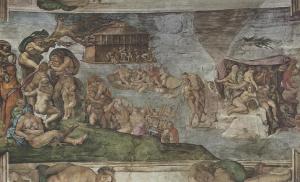
From wikicommons
The Bible is ambiguous when it comes to defining hell. Still, I have notice a surprising consistency in what it has to say. Hell seems to be about trusting in God’s mercy.
Does that seem odd, to align hell with mercy? Don’t we all know that hell is the doctrine of eternal punishment? And doesn’t that mean Christians can either accept it or reject hell? And doesn’t that filter us into conservatives and progressives?
I’d like to think of hell differently.
The Rich Ambiguity of Hell
Did you notice that I called scripture’s account ambiguous? It is. Even the vocabulary varies, as translators seek ways of rendering into English terms like Sheol, Hades, Gehenna, skotos. Those are not synonyms. Rather, they are various terms the ancient and Hellenistic Jews who wrote the Bible used to talk about the question of death’s finality in relation to God.
I appreciate all that ambiguity. It’s appropriate to the theme. The expansive imagery and vocabulary allows the authors to dig into a lot of raw and, for me, compelling humanity. So the Psalmist can register a fear that Sheol will be his end (18). Job can beg, beautifully and tragically, to be hidden in Sheol until God’s wrath is past, and then hope the cooled-down creator remembers where he stowed him away (14:13).
Paul speaks of death as the fitting trajectory of sinfulness, and hopes that the ultimate judgment of a righteous and good God will be the end of both (Romans 3). Jesus’ parables tend to give the anxious imagery of the Psalms a twist in the direction of some of their more hope-filled resolutions. Hades is, for Jesus, not the feared grave, but the confidence that the wicked who seem to be escaping God’s judgment are still answerable to God in the end.
Are We Stuck with Hell?
Why, though, would I say that any of that has to do with God’s mercy?
I find that many Christians feel constrained when it comes to hell. We want to throw ourselves on God’s mercy, but worry that the biblical God’s mercy has a limit. This is especially apparent in some of Jesus’ parables. The wrong wedding garment (not to be confused with The Wrong Trousers), Lazarus and Dives, the sheep and the goats. How do we read these, if not as the affirmations of eternal damnation?
Some relief might come when we recall that God was incarnate not in a code of metaphysics but in a rabbi. Rabbis didn’t then, and don’t now, tend to speak in universal platitudes. They exegete particular passages and then engage in particular conversations. Jesus doesn’t talk to humanity, he talks to Mary and Martha. He doesn’t give us the blueprint of hell, he tells a story about ranchers and says “it’s like that.”
Parables of Mercy
So when the parable is about hell or Hades, we should assume he’s registering a need in his listeners to hear something very particular. The gospels in fact give us quite a lot of details about what his listeners are mumbling, and what he perceives, and I think that’s not by accident. It helps shape what he’s about to say.
With the sheep and the goats (Matt. 25), for instance, it seems clear that he is looking for a way to challenge the self-righteousness of his listeners. You imagine that you are recipients of God’s mercy? And this confidence allows you to forgo practices of mercy yourself? Wouldn’t it be a shock if you got sorted among the sinners? Ruminate on that while you watch that shepherd sort sheep from goats. Or: remember that apocalyptic image of a lake fire as the judgment of God on the wickedness of Lucifer’s angels? What if your lack of mercy is like theirs? What end do you suppose awaits you?
A parable is an analogy meant to disorient and then reorient its hearer. To read parables as codings for literal beliefs is to miss this point entirely. Reading about the separation of farm animals or the fates of unmerciful angels as the doctrine of an eternal hell is like reading of the parable of the sower and saying, “Ah, I see: so in the end we’re all seeds?”
Hell and the Diagonal Way
Despite all that context specificity, though, I find a consistency in Jesus’ parables on hell, whether we read about the goats or Dives or even the shocking ending of the wedding feast, when the man with the wrong robes is thrown out into skotos, darkness. That consistency is what I’m calling in this column the diagonal way. God is merciful, yet we only discover this mercy—and so discover this God— through our own habit-forming acts of mercy.
If I claim to know God yet am not formed by habits of mercy, I know someone other than the merciful God of Israel. It’s kind of like showing up at a wedding dressed for a day at the beach. Or like a goat who talks all day about how happy he is to be a sheep. We’ve lost track of ourselves as merciful creatures of a merciful God.
Hell is not a single idea, then, but a set of vocabulary terms that people of the Jewish and Christian faiths have used to say two things:
- We’re all lost in darkness unless the mercy of God finds us.
- But we’re just as lost if, when that Mercy finds it, we’re so merciless ourselves that we don’t notice we’ve been found.
Such an end is unfathomable, really, just like a lake that burns with unquenchable fire is unfathomable. But if it were possible to be an entirely unmerciful creature of an entirely merciful God, maybe it would be kind of like that. And that sounds like hell to me.











